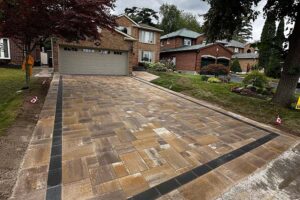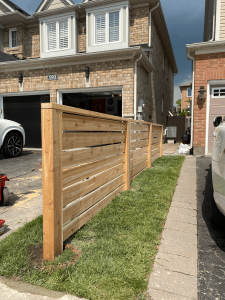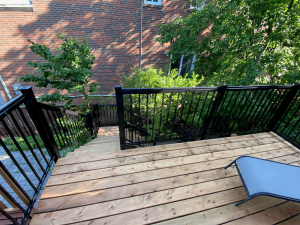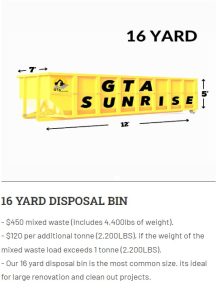Have you ever considered the cost of paving your driveway or patio with interlocking stones? Interlocking is a cost-effective way to give your outdoor space a makeover and increase the value of your home. It can also save you time and effort on maintenance, as it requires less upkeep than other materials. But with so many options available, knowing what budget you should set aside for this project can be hard. In this article, we’ll break down the different factors that go into pricing interlocking projects and estimate what they typically cost.
Interlocking is a popular choice for outdoor landscaping projects due to its durability and ease of care. With a wide range of colours, patterns, and sizes available, homeowners can find the perfect fit for their home’s style and budget. Interlocking is also eco-friendly since it doesn’t require any sealant or paint for protection against the elements. However, the cost of interlocking projects can be a concern for some. The total cost of a project depends on various factors, including size, complexity, pattern design, and labour costs. Nonetheless, there are ways to get an accurate estimate without breaking the bank. By understanding the components that make up the total cost and shopping around for competitive rates from different contractors, you can get the best deal on quality materials and installation services. In this article, we’ll cover everything you need to know about interlocking prices so you can make an informed decision when planning your next project.
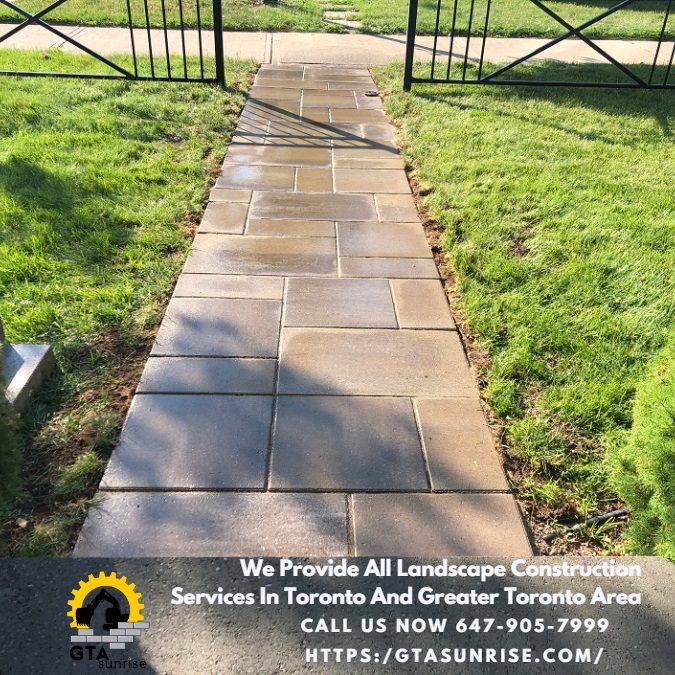
The cost to install interlocking pavers varies depending on the location, the type of paver used, and the company installing them. According to a few sources, installing interlocking pavers can range from $10 to $27 per square foot. However, the national average cost of installing interlocking pavers for a patio is around $3,400. The cost per square foot can also vary depending on the materials used, labour costs, permits, and inspections required. Therefore, it is recommended to get a quote from a professional contractor to obtain an accurate estimate for the installation of interlocking pavers.
Definition Of Interlocking
Interlocking is a construction technique used to build hardscapes, such as patios and walkways. It involves laying down individual pieces of stone, brick, or concrete in order to create a sturdy, durable surface. The pieces are designed to fit together like puzzle pieces and can be arranged in various patterns. Interlocking can be used to construct various structures, such as driveways, retaining walls, staircases, and outdoor living spaces. The cost of interlocking depends on the size of the project, the type of material used, and the complexity of the design.
When it comes to materials for interlocking projects, there are many different options available. Common materials include stones like flagstone or slate; bricks; concrete pavers; or pre-cast concrete blocks. Each material possesses its own unique characteristics that will impact the total cost of your project. For example, flagstone tends to be more expensive than other types of stone because it is more difficult to install due to its irregular shape and weight. Bricks are typically cheaper than stones but require more maintenance over time compared with other materials.
The complexity of the design is another factor that impacts interlocking costs. As you add more intricate elements, such as curves or steps, into your design, it will require additional time and skill from your contractor, which will increase the overall cost of your project. Similarly, choosing a large area for your project could also require extra labour, which would result in higher costs than choosing a smaller space instead.
Factors Affecting Price
The cost of interlocking depends on several factors. First, the type of material used to make the interlock affects the price, as more expensive materials often have higher costs associated with them. Second, the size and complexity of the interlock can also affect the price. More intricate patterns or larger areas may require more labour and materials, leading to increased costs. Finally, the location where the installation is taking place can influence how much it will cost. For example, if a professional must be hired to do the job in an area with high labour costs, this could add up quickly.
All these factors should be taken into consideration when budgeting for an interlocking project. The overall cost can vary greatly depending on the type of material used, how complex and large it is, and where it’s installed. Getting quotes from multiple sources and carefully comparing them is important before making a decision about which option is best for you.
DIY Costs
DIY costs for interlocking can vary depending on the type of project you are doing. For a small patio, it can cost around $3 per square foot to install interlocking bricks or pavers. This cost includes materials such as the pavers or bricks themselves, sand, and gravel. The cost per square foot increases for larger projects such as driveways or walkways because of the additional materials needed. In addition to the pavers or bricks, there may also be a requirement for underlying material such as crushed stone or concrete aggregate, which increases the overall cost.
For DIY projects that require specialized tools and equipment, such as those necessary for laying down a retaining wall block system, there will also be additional costs associated with renting or purchasing these items. It is possible that you will need to purchase extra materials, such as sanding sealers and edging products, in order to complete your project. The degree of difficulty of your task will also play a role in this. These items can add significantly to your overall interlocking project costs.
Suppose you are considering installing interlocking in your yard yourself. In that case, it is important to do research about materials and supplies in order to get an accurate estimate of what it will cost you. You should also factor in any additional labor costs you may incur if you decide to hire someone else to help with installation or other aspects of the project. Doing this research ahead of time will help ensure that you don’t end up spending more than necessary on your DIY interlocking project.
Hiring A Professional
Hiring a professional to install interlocking can be expensive, but it’s worth it for the quality of the work. You’ll need to research and get several estimates from different contractors. Make sure you understand exactly what the contractor is offering, including materials and labor costs, so that you can make an informed decision.
When comparing estimates, look for a company with a good reputation and years of experience in the industry. Ask for references from past customers and read any reviews or testimonials they have online. It’s also important to check that the contractor has all the necessary credentials, such as being licensed and insured.
Finally, make sure you get everything in writing before signing a contract. This should include when they begin work, any deadlines they need to meet, the estimated cost of materials and labour and how payments will be accepted. With all this information in hand, you can go ahead and hire a professional with confidence.
Looking for a reliable and experienced interlocking contractor for your outdoor landscaping project? Look no further than GTA Sunrise! Our team of skilled professionals has the knowledge and expertise to handle all your interlocking needs. We offer a wide range of interlocking services, including driveway, patio, walkway, and pool design and installation. Contact us now for a free quote, and let us help you transform your outdoor spaces into a beautiful and functional oasis. For other related information, you may visit our Blog page.
Benefits Of Professional Installation
Hiring a professional for your interlocking project in Markham can be beneficial in several ways. Not only does it ensure that the job is done correctly, but it also allows you to save time and money. Professional installation typically costs more than DIY installation, but the cost of the project is often offset by the quality of workmanship and peace of mind that comes with it.
When considering a professional installation, one should consider all aspects of the job, including labour costs and materials used. Professional installers often use higher-quality materials that are designed to last longer and require less maintenance over time. In addition, they may be able to offer additional services, such as sealing or staining, which can further protect and enhance your interlocking project.
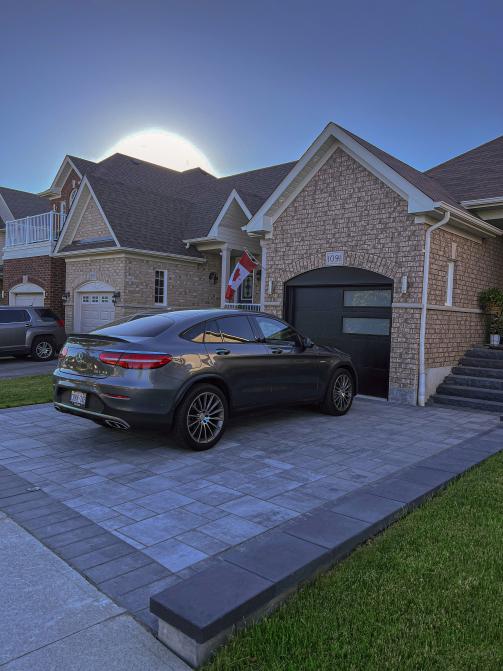
The expertise of a professional installer can be invaluable when selecting material, designing layouts, or addressing potential drainage issues. By having an experienced set of eyes on your project, you can rest assured that the job will be completed properly and efficiently. Investing in professional installation of interlocking means that you won’t have to worry about the appearance of your project being anything less than perfect! Professional installation ensures that your project will look great for years to come.
Overall, under proper circumstances, hiring a professional landscaper in Markham projects can provide many benefits, such as better quality materials, expertise in design and layout, and improved longevity of the product.
Types Of Interlocking Materials
Interlocking materials come in a variety of types, styles, and prices. The type of material used will depend on the intended purpose, budget, and desired look. For example, pavers are commonly used for driveways and walkways because they are durable and relatively affordable. Natural stone is also an option for those looking for a more natural look. While it does cost more than pavers, it can add a luxurious feel to any outdoor space. Concrete is another option that is often used for patios and pool decks due to its affordability and versatility. It’s also easy to maintain since it doesn’t require sealing or other treatments like some other materials do. Lastly, interlocking tiles are popular as they provide an easy-to-install solution that can be used indoors or outdoors. They come in various colours and designs to find something that fits your style perfectly. Depending on the quality of the product you select, the price per square foot for interlocking might range from $5 to $20.
Maintenance Costs
The upkeep expenses for interlocking can change with the scope of the project and the materials chosen. Generally, asphalt is cheaper to maintain than brick or stone. Asphalt must be sealed every few years, costing around $0.50 to $1 per square foot. Brick and stone need to be resealed annually, costing up to $3 per square foot. In addition, weeds may grow between the stones and must be removed regularly. This requires manual labour and could add to maintenance costs as well.
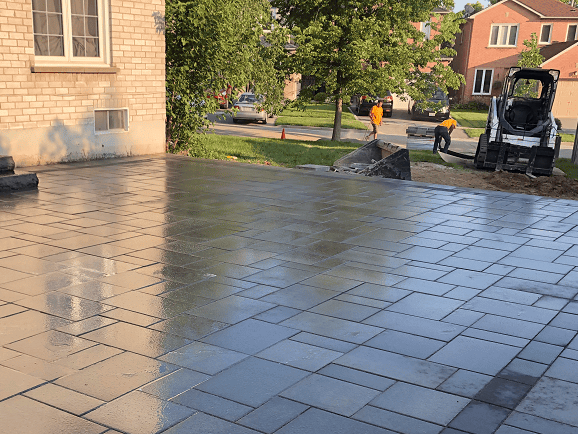
It’s also important to consider the long-term costs associated with interlocking installation. Depending on the climate and how much use it gets, it may need to be replaced after 10-15 years. The cost of interlocking materials can range from $10-$25 per square foot depending on the type of material used. Homeowners should factor this into their budget when considering interlocking installation.
Replacing an existing driveway with interlocking can also require additional work, such as grading or excavation, which adds extra cost to the project. It’s best to consult a professional before starting any major projects like this so that you have an accurate estimate of what it will cost in total.
Warranty Considerations
When considering the cost of interlocking, it’s important to take into account the warranty that comes with the product. Many manufacturers offer warranties on their products, ranging from five to fifteen years. These warranties can cover any defects or damage that occurs during installation or regular use of the interlocking material.
It’s important to read the fine print of any warranty before making a purchase. Many manufacturers require periodic maintenance and cleaning to keep their warranties valid. It could include resealing, power washing, and other upkeep procedures. It is important to know what must be done to keep your warranty in effect and how much money will be spent on parts and labor.
When looking for a reliable interlocking company, choose one with a good reputation for honouring their warranty claims. Ask around for recommendations and check online reviews before making your final decision. Choosing an established manufacturer whose products are backed by a solid warranty can save you money in the long run if something goes wrong with your interlocking material.
Do-It-Yourself Tips
Now that you have considered the warranty factors, it’s time to look into do-it-yourself tips for installing interlocking. Depending on the project and the materials used, DIY installation of interlocking can be a cost-effective option. After all, hiring a professional contractor can add significantly to the overall cost.
Before beginning any project, it is crucial to ensure that you have all the necessary tools and materials. A basic set of tools should include a shovel or small backhoe, saws, and measuring tapes. Having wheelbarrows and wheeled carts for moving supplies around your work site is also helpful. Additionally, you will need enough patio stones to complete the project, as well as gravel and sand for the base layer.
When installing interlocking yourself, accuracy is key when it comes to measurements and cuts. To ensure precision in your layout plan, use string lines or spray paint with stakes to mark the boundaries of your patio. Once you have laid out the stones at their desired locations, use a rubber mallet or hammer gently place them in place while maintaining level surfaces throughout your work area. By following these tips, you can achieve excellent results from your interlocking project while still saving money.
How Long Does Interlocking Last?
Interlocking is a popular form of paving and can be used in many different ways. It is an attractive, durable and cost-effective solution for many projects, but one of the most important questions to ask when considering interlocking is how long it will last. This article will discuss this material’s longevity and what factors may affect its lifespan.
When determining the life expectancy of any material, the first aspect to consider is the quality of the product. If you are using a high-quality interlocking product with proper interlocking installation techniques and maintenance, you can expect your interlocking to last anywhere from 10-20 years. Factors such as weather conditions, traffic levels and other environmental elements can impact the life span, so these should also be considered.
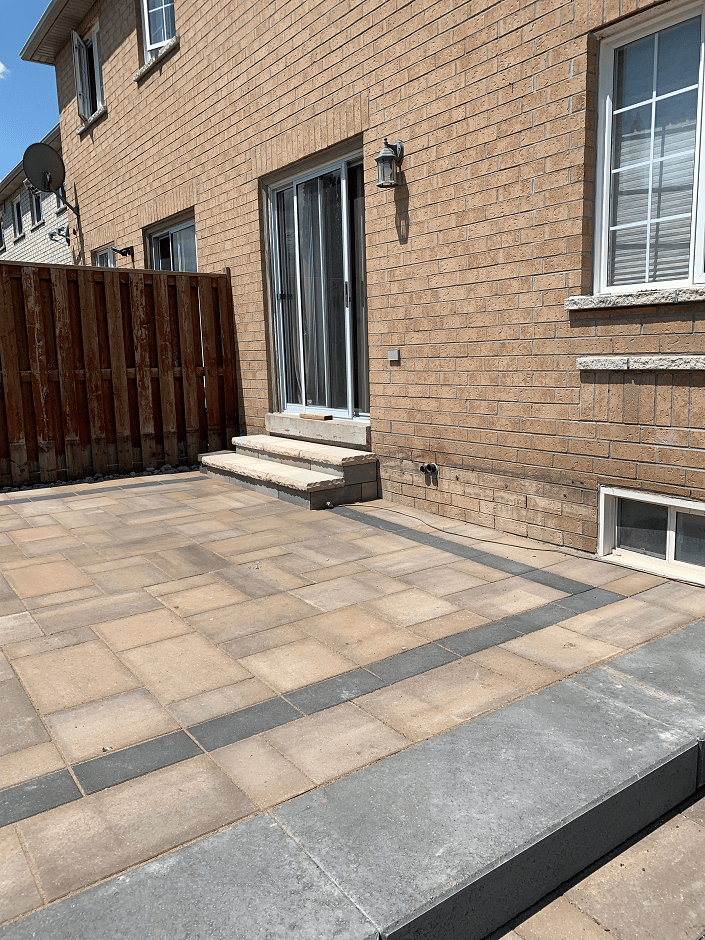
In addition to the quality and environment, another factor that will influence the lifespan of your interlocking is how often it is maintained. Regular cleaning and sealing can help keep your interlocking looking good for longer while preventing dirt, debris and moisture from seeping through cracks or gaps in the surface. This can help extend its life significantly.
If you choose a high-quality interlocking product and maintain it properly over time, you can expect it to last for many years. The actual duration of an interlocking surface will depend on various factors such as climate conditions, usage levels, and regular maintenance practices. However, with proper care, it should provide a beautiful finish for many years to come.
A Durable and Affordable Option for Outdoor Surfaces
In conclusion, interlocking is a great option for a variety of surfaces. It can be professionally installed quickly and will likely last for many years, depending on the weather conditions. It’s a good choice if you want to avoid the cost and time associated with concrete driveways. Interlocking stones is also more durable than concrete in extreme weather conditions. It is an ideal driveway solution in areas that experience harsh temperatures or frequent rainfall. Plus, it looks great! Interlocking can be a great choice for driveways and other outdoor surfaces. The cost depends on the area and complexity of the installation, but it’s generally affordable compared to other options. With proper maintenance, you can expect your interlocking to last for years.
